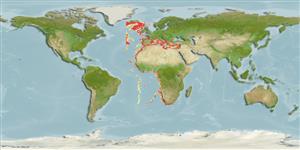Common names from other countries
>
Ophidiiformes (Cusk eels) >
Bythitidae (Livebearing brotulas)
Etymology: Cataetyx: Greek, kata = down + Greek, etix, stixo, stizo = to prick, to puncture.
Environment: milieu / climate zone / depth range / distribution range
पारिस्थितिकी
समुद्री बाथीड़िमरसल; गहराई सीमा 500 - 2400 m (Ref. 34024). Deep-water; 64°N - 36°S, 29°W - 35°E
Eastern Atlantic: scattered localities around the British Isles, Azores and France, along the coast of West Africa to the Cape of Good Hope; also recorded from the western Mediterranean. Reported from Iceland (Ref. 12462). Reported from the Gulf of Mexico (Ref. 37039).
Length at first maturity / आकार / वज़न / Age
Maturity: Lm 35.0, range 30 - 40 cm
Max length : 65.0 cm TL पुल्लिंग / अलिंग; (Ref. 37039)
पृष्ठीय रीढ़ (सम्पूर्ण): 0; पृष्ठीय सौफट रेज़ (सम्पूर्ण): 98-107; गुदा कांटा 0; ऐनल सौफट रेज़: 75 - 83; जानवरों की रीड़ का जोड़: 60 - 61. Branchiostegal rays 8.
Uncommon bathydemersal or benthopelagic species (Ref. 34024). Viviparous (Ref. 4758).
Life cycle and mating behavior
परिपक्व अवधि | पुनरुत्पत्ति | मछलीऔ का अंडे देना | अंडे | Fecundity | लार्वा
Nielsen, J.G., D.M. Cohen, D.F. Markle and C.R. Robins, 1999. Ophidiiform fishes of the world (Order Ophidiiformes). An annotated and illustrated catalogue of pearlfishes, cusk-eels, brotulas and other ophidiiform fishes known to date. FAO Fish. Synop. 125(18):178p. Rome: FAO. (Ref. 34024)
IUCN Red List Status (Ref. 130435)
CITES (Ref. 128078)
Not Evaluated
Threat to humans
Harmless
Human uses
मात्स्यिकी: कोई रुचि बग़ैर
अधिक जानकारी
संदर्भजलीयकृषिजलीयकृषि रूपरेखाखींचआनुवंशिकीElectrophoresesहैरेटिबिलटीबीमारीप्रक्रमणMass conversion
सहयोगीयोतस्वीरेStamps, Coins Misc.ध्वनिसिगुयटिरारफ्तारतैरने के प्रकारगिल क्षेत्रOtolithsदिमागदृष्टि
साधन
Special reports
Download XML
इंटरनेट स्रोत
Estimates based on models
Preferred temperature (Ref.
115969): 3.7 - 13.2, mean 6.5 (based on 300 cells).
Phylogenetic diversity index (Ref.
82804): PD
50 = 0.5002 [Uniqueness, from 0.5 = low to 2.0 = high].
Bayesian length-weight: a=0.00457 (0.00179 - 0.01169), b=3.10 (2.87 - 3.33), in cm Total Length, based on LWR estimates for this (Sub)family-body shape (Ref.
93245).
Trophic level (Ref.
69278): 3.7 ±0.6 se; based on size and trophs of closest relatives
लौटाव (Ref.
120179): निम्न, न्यूनतम जनसंख्या दुगनी होने का समय 4.5 - 14 वर्ष। (Preliminary K or Fecundity.).
Fishing Vulnerability (Ref.
59153): Moderate to high vulnerability (46 of 100).
